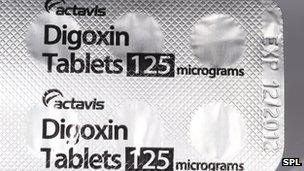Reassurances over heart drug digoxin after death link
- Published

Digoxin is used to treat heart failure as well as arrhythmias
Research suggests a common heart drug used by thousands in the UK is linked with a significant increase in deaths.
But experts insist the drug digoxin is still safe to use.
The trial in the European Heart Journal of 4,000 patients found digoxin treatment for atrial fibrillation (AF), an abnormal heart rhythm, was linked with a 41% increase in deaths.
For every six patients on digoxin for five years, one would die who may not have otherwise, say the authors.
Investigators at the University of Kentucky looked at the findings of a study involving 4,060 patients. Around half of these were prescribed digoxin while the others were given different heart medications or treatments.
Over the course of the study, 666 patients died and 375 of these had been on digoxin at their last follow-up visit.
After taking into consideration other risk factors, such as general health and other illnesses and medications, digoxin appeared to be independently linked with:
a 41% increase in deaths from any cause
a 35% increase in deaths from cardiovascular causes
a 61% increase in deaths from irregular heart rhythm, or arrhythmia (other than AF).
UK heart experts say although the study found a link between digoxin and deaths, this does not necessarily mean that the drug itself is to blame or that it should no longer be used.
Around 800,000 people in the UK have AF, the most common type of arrhythmia.
'More research'
Natasha Stewart, senior cardiac nurse at the British Heart Foundation (BHF), said: "Heart patients should not be too alarmed by this study as digoxin is not the primary treatment for atrial fibrillation in the UK.
"However, there are good reasons why some AF and heart failure patients are still taking digoxin, as it can help them to manage their condition.
"Before we jump to any conclusions about the dangers of the drug, we'd need to see further research into what might be causing these increased risks.
"Patients who are prescribed digoxin should not stop taking their meds without discussing their concerns with their doctor."
The BHF says that in 2011 there were 4,659,000 prescriptions for digoxin in the UK.
AF can be treated with medication to slow the irregular heartbeat and blood-thinning drugs to cut the risk of clots developing in the heart, which can lead to a stroke.
Risks v benefits
Doctors considering prescribing any drug take into account the relative risks and benefits.
The researchers say it is unclear precisely why digoxin is linked with deaths, but say the findings "call into question the widespread use of digoxin in AF patients".
Lead researcher Prof Samy Claude Elayi said: "We found death risk was linked with the drug itself and not because patients taking the drug were sicker.
"We are not saying digoxin should never be used. There are some occasions where there might be no other alternative. But we are saying it should not be used as a first-line treatment and we should be extremely careful.
"When you do use it, it should be at low doses and with close monitoring.
"And there should be more studies of the drug."
- Published23 May 2012
- Published29 March 2011